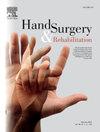横向超声引导下的外上髁炎筋膜切开术。
IF 1
4区 医学
Q4 ORTHOPEDICS
引用次数: 0
摘要
外上髁炎是一种非常常见的肌腱病,可以自愈。诊断以临床为主。治疗方法通常为非手术。然而,如果保守治疗失败,开放或关节镜下的上髁肌腱切断术可能是一种选择。超声引导下的经皮肌腱切开术现在可以在靠近髋端的上髁总肌腱上进行,其成功率接近传统手术。几年来,我们使用了一种稍微不同的技术,包括超声引导下的指跖伸肌和桡腕短伸肌的筋膜切开术。它可以在办公室局部麻醉下进行。超声引导下的筋膜水解剖是必要的,以方便手术和容易地看到各种解剖结构。筋膜切开术可以用眼科手术刀、手术刀或弯针进行。该手术类似于关节镜技术,但明显更便宜且碳足迹更低。当有超声引导手术经验的外科医生进行时,它是安全有效的。本文章由计算机程序翻译,如有差异,请以英文原文为准。
Transverse ultrasound-guided fasciotomy in lateral epicondylitis
Lateral epicondylitis is a very common form of tendinosis that may heal spontaneously. Diagnosis is mainly clinical. Treatment is usually non-operative. However, if conservative treatment fails, open or arthroscopic tenotomy of the epicondylar muscles may be an option. Ultrasound-guided percutaneous tenotomy may now be performed on the common epicondylar tendon close to the enthesis, with a success rate close to that of conventional surgery. For several years now, we have used a slightly different technique, involving ultrasound-guided fasciotomy of the extensor digitorum communis and extensor carpi radialis brevis muscles at the level of the radiohumeral joint. It may be performed under local anesthesia in the office. Ultrasound-guided hydro-dissection of the fascia is essential to facilitate the procedure and easily visualize the various anatomical structures. Fasciotomy can be performed with an ophthalmology scalpel, surgical knife or curved needle. This procedure is similar to arthroscopic techniques, but is significantly less expensive and with lower carbon footprint. It is safe and effective when a surgeon with experience in ultrasound-guided procedures performs it.
求助全文
通过发布文献求助,成功后即可免费获取论文全文。
去求助
来源期刊

Hand Surgery & Rehabilitation
Medicine-Surgery
CiteScore
1.70
自引率
27.30%
发文量
0
审稿时长
49 days
期刊介绍:
As the official publication of the French, Belgian and Swiss Societies for Surgery of the Hand, as well as of the French Society of Rehabilitation of the Hand & Upper Limb, ''Hand Surgery and Rehabilitation'' - formerly named "Chirurgie de la Main" - publishes original articles, literature reviews, technical notes, and clinical cases. It is indexed in the main international databases (including Medline). Initially a platform for French-speaking hand surgeons, the journal will now publish its articles in English to disseminate its author''s scientific findings more widely. The journal also includes a biannual supplement in French, the monograph of the French Society for Surgery of the Hand, where comprehensive reviews in the fields of hand, peripheral nerve and upper limb surgery are presented.
Organe officiel de la Société française de chirurgie de la main, de la Société française de Rééducation de la main (SFRM-GEMMSOR), de la Société suisse de chirurgie de la main et du Belgian Hand Group, indexée dans les grandes bases de données internationales (Medline, Embase, Pascal, Scopus), Hand Surgery and Rehabilitation - anciennement titrée Chirurgie de la main - publie des articles originaux, des revues de la littérature, des notes techniques, des cas clinique. Initialement plateforme d''expression francophone de la spécialité, la revue s''oriente désormais vers l''anglais pour devenir une référence scientifique et de formation de la spécialité en France et en Europe. Avec 6 publications en anglais par an, la revue comprend également un supplément biannuel, la monographie du GEM, où sont présentées en français, des mises au point complètes dans les domaines de la chirurgie de la main, des nerfs périphériques et du membre supérieur.
 求助内容:
求助内容: 应助结果提醒方式:
应助结果提醒方式:


